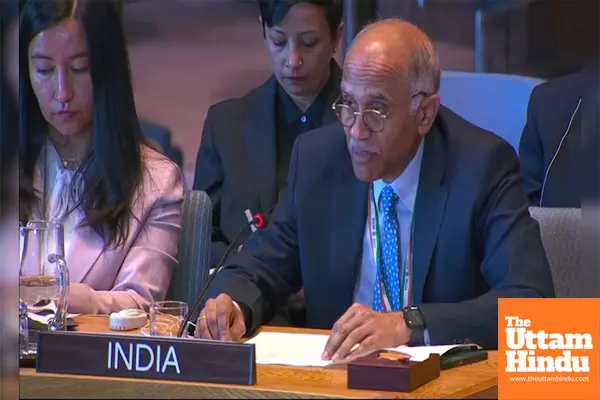
India at UNGA: Religious Discrimination Impacts Followers of All Faiths

New Delhi (The Uttam Hindu): India has reiterated its commitment to stand united with UN members in condemning religious intolerance, particularly against Muslims while emphasizing that religious discrimination is a broader issue affecting all faiths. Speaking at the UN General Assembly's informal meeting to mark the International Day to Combat Islamophobia, India's Permanent Representative to the UN, Ambassador P Harish, highlighted India's diversity, being home to over 200 million Muslims and the birthplace of four world religions: Hinduism, Buddhism, Jainism and Sikhism.
Harish stated that fostering a world free from religious discrimination and violence is integral to India’s values. He condemned incidents of religious intolerance against Muslims but stressed that religious discrimination affects followers of all faiths and must be addressed universally. He urged the international community to recognize that "religio-phobia" threatens global societal fabric and that progress lies in acknowledging this issue.
The Indian envoy called for a collective global commitment to treat all citizens equally and end religious discrimination. He also emphasized the importance of education systems that promote tolerance and do not perpetuate stereotypes or bigotry.
India voiced concern over the rising violence against religious communities and places of worship worldwide. Harish urged Member States to commit to the principle of equal respect for all religions and to counter discrimination through sustained action.
Harish also stressed that the fight against Islamophobia is closely linked to the broader struggle against all forms of religious discrimination. He called for a future where every individual can live with dignity, security, and respect, regardless of their faith.
The UN General Assembly adopted a resolution sponsored by 60 member states of the Organization of Islamic Cooperation (OIC) to designate March 15 as the International Day to Combat Islamophobia. The resolution emphasized that terrorism and violent extremism should not be associated with any religion, nationality, or ethnic group and called for global efforts to promote tolerance and peace based on respect for human rights and religious diversity.
UN Secretary-General Antonio Guterres, in his message, highlighted the disturbing rise in anti-Muslim bigotry and the global increase in violence, discrimination, and exclusion against Muslims. He noted that attacks on any religious group threaten the rights and freedoms of all people and called for governments to foster social cohesion, protect religious freedom, and curb hate speech on online platforms.
In closing, Harish stressed that in an increasingly fractured world, the UN must remain a unifying force promoting peace, security, and respect for all faiths.
India at the United Nations General Assembly (UNGA) refers to India's participation in the annual gathering of the UN's main deliberative body, where representatives from all 193 member states meet to discuss and address global issues such as peace, security, human rights, sustainable development, climate change, and international law.
The UNGA is one of the six main organs of the United Nations and serves as a forum for countries to express their views and collaborate on matters of international concern. The General Assembly meets once a year in New York, typically in September, for its regular session.
Key aspects of India's role at the UNGA:
1. Speech by the Prime Minister or External Affairs Minister:
- India's leader, either the Prime Minister or the External Affairs Minister, traditionally addresses the General Assembly, outlining India's foreign policy, positions on global issues, and proposals for international cooperation.
- These speeches are significant and are closely followed by the international community. For example, India's stance on topics like climate change, disarmament, peacekeeping, and economic development often come up during these speeches.
2. India’s Contributions to Global Issues:
- India advocates for global issues such as the need for reforming the United Nations, ensuring climate justice, promoting sustainable development, countering terrorism and strengthening multilateralism.
- India also often calls for greater representation of developing nations in decision-making bodies like the **UN Security Council**.
3. Leadership in Global South:
- India represents the interests of many developing countries, especially in the Global South and works to ensure that their voices are heard in international discussions.
- India has historically taken leadership in advocating for the Non-Aligned Movement (NAM) and has expressed support for South-South cooperation.
4. India’s Voting and Diplomatic Role:
- As a member of the UN, India actively participates in voting on resolutions and issues being discussed by the General Assembly.
- India is known for its diplomatic engagement, building alliances with other countries and working to resolve global conflicts and issues.
5. Key Issues for India at the UNGA:
- Terrorism: India has consistently called for a comprehensive approach to combat terrorism and has advocated for the adoption of the Comprehensive Convention on International Terrorism.
- Climate Change and Sustainable Development: India has emphasized the importance of climate justice and equitable solutions to climate change, stressing that developed countries should take responsibility for their historical emissions.
- Global Governance Reform: India seeks a permanent seat on the UN Security Council as part of efforts to make the UN system more inclusive and representative of the current geopolitical realities.
In summary, India's participation at the UNGA is an important aspect of its foreign policy, helping the country engage with global issues, promote its interests, and contribute to international peace and development.

